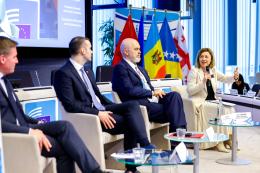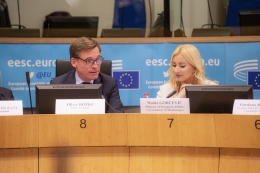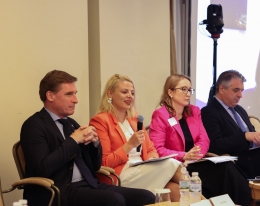European Economic
and Social Committee
Χώρες της διεύρυνσης
Η ΕΟΚΕ συμμετέχει ενεργά στη διαδικασία διεύρυνσης της ΕΕ και έχει αναπτύξει διττή προσέγγιση ―περιφερειακή και διμερή― στις σχέσεις της με τις οργανώσεις της κοινωνίας των πολιτών στις χώρες της διεύρυνσης.
Σε ό,τι αφορά την περιφερειακή προσέγγιση, το κύριο μέσο για τον συντονισμό των δραστηριοτήτων της ΕΟΚΕ στην περιοχή των Δυτικών Βαλκανίων αποτελεί η επιτροπή παρακολούθησης «Δυτικά Βαλκάνια», ένα μόνιμο εσωτερικό όργανο της ΕΟΚΕ. Το Φόρουμ της κοινωνίας των πολιτών των Δυτικών Βαλκανίων, το οποίο διοργανώνεται κάθε δύο χρόνια, εντάσσεται στο πλαίσιο του έργου της επιτροπής παρακολούθησης.
Η ΕΟΚΕ συνεργάζεται επίσης σε διμερές επίπεδο με τις χώρες των Δυτικών Βαλκανίων και την Τουρκία. Βάσει συμφωνιών σύνδεσης μεταξύ αυτών των χωρών και της ΕΕ, και προκειμένου να συμμετάσχουν οι οργανώσεις της κοινωνίας των πολιτών στις προενταξιακές και ενταξιακές διαδικασίες, η ΕΟΚΕ έχει δημιουργήσει τρεις κοινούς φορείς με τους εκπροσώπους της κοινωνίας των πολιτών – με την Τουρκία, το Μαυροβούνιο και τη Σερβία. Κάθε φορέας αποτελείται από ίσο αριθμό μελών από την ΕΟΚΕ και τη χώρα εταίρο και συνεδριάζει δύο φορές τον χρόνο.
Η ΕΟΚΕ διατηρεί τακτικές επαφές και διοργανώνει κοινές δραστηριότητες με τις οργανώσεις της κοινωνίας των πολιτών των χωρών της διεύρυνσης με τις οποίες δεν έχει θεσπιστεί ακόμη κοινό όργανο εκπροσώπων της κοινωνίας των πολιτών.
Το έργο των κοινών οργάνων συμπληρώνεται με την εκπόνηση γνωμοδοτήσεων της ΕΟΚΕ για τις προενταξιακές και ενταξιακές διαδικασίες των επιμέρους χωρών, καθώς και για θέματα περιφερειακού ενδιαφέροντος.









